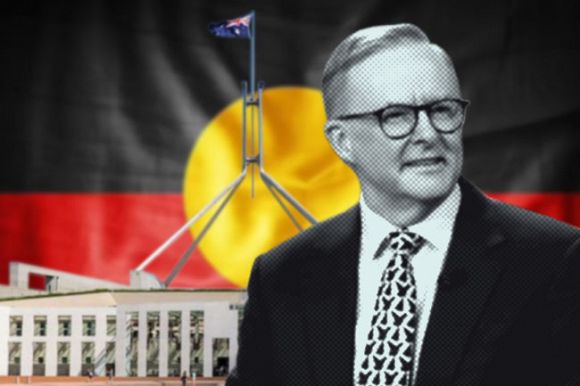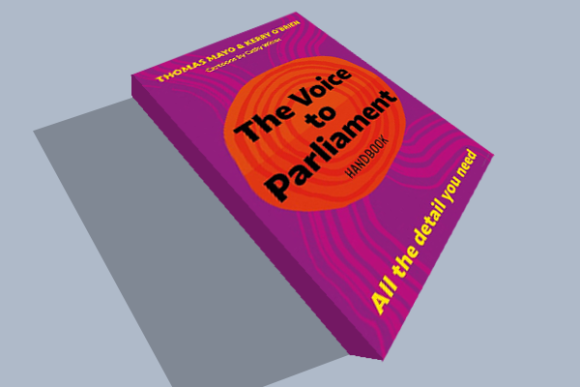Despite the limitations and shortcomings of the proposed Voice to Parliament, the 'Yes' campaign remains the favourable outcome, writes John Card.
IT'S NO SECRET that the many various groups and personalities on the activist Left in this country don't all see completely eye-to-eye on the impending Indigenous Voice to Parliament referendum. While the far-Right gets to be unanimous in its frothing hatred of the Voice and its intent to vote “No”, most of us progressives have been forced to take a much more nuanced position.
The push for a Voice to Parliament started back in 2017, when the Uluru Statement from the Heart petitioned the Coalition Government for some sort of Indigenous representation to be enshrined in the Australian Constitution. The Uluru Statement was the culmination of years of meetings between hundreds of Indigenous leaders from all over the country, but despite not asking for more than a seat at the table in Canberra, then-PM Malcolm Turnbull called the Statement's proposed Voice “not desirable” and flatly rejected the idea.
Turnbull's successor, Scott Morrison, spent his time in office frequently and more explicitly denouncing the Uluru Statement. But at least, come the 2022 Election, the essential proposal to enshrine an Indigenous parliamentary advisory body into law was popular enough that Anthony Albanese was willing to support it as part of the campaign that eventually made him Prime Minister.
Since the Labor Party got into office, the Indigenous Voice to Parliament is the closest it's ever been to becoming a political reality. This is to say, Albanese dug up the shelved Turnbull-era proposal, which he turned into the basis of the looming referendum we know today.
While many to the left of the ALP believe that Albanese's support for a Voice vote is largely just playing politics – and we'd certainly prefer more radical change – the question of whether or not to embrace even a token concession like this still persists among our side. There are plenty of valid concerns and criticisms with the way the Albanese Government is going about implementing the Voice Referendum to be made from the Left.
Furthermore, no genuine progressive thinks a win for the “Yes” campaign is going to magically fix every racial problem in the land overnight — and I know most of us on the far-Left wouldn't otherwise be all that keen on handing Albo a big PR win for slapping a Labor-branded bandage over 240 years of colonial inequity.
In all my years of organising politically, no matter what the issues, I've maintained that the best course of action is always to focus on specific problems that can be addressed practically and materially. The proposed Indigenous Voice doesn't necessarily offer any concrete material benefit and since we know that any capitalist government would never willingly curb its own authority, we can't even hope it would be a meaningful check on the heavy-handed approach this country's federal legislature takes on Indigenous issues.
That being said, even as a diehard anarchist – and no big fan of elections or any government at all – I think paying attention to this referendum matters and that voting “Yes” is still the unambiguously correct choice.
I usually advise people I organise alongside that it's best to not get bogged down discussing the “culture war” arguments the far-Right spews out — they're largely just things conservatives make up themselves to get mad about and waste everyone else's time with. But when something like the Voice to Parliament is being seriously discussed at the highest levels of politics and is all set to be put to a nationwide vote before the end of the year, I think anyone who considers themselves politically engaged ought to be willing to take a serious look at what's on the table.
If the “No” campaign wins in the end, literally nothing formally changes — no new laws will be put on the books, no amendments to the Constitution will be made and no Indigenous advisory body to Parliament will be put together.
At the same time, reactionaries of all sorts – from the conservative faction of the Liberal Party, to the Murdoch-owned commentators over at Sky News, to this country's incipient neo-Nazis – will feel all the more emboldened by the fact that a majority of the population is not yet willing to hand Australia's First Nations peoples even the slightest constitutional recognition.
If the “Yes” campaign wins, the Australian Left picks up at least a symbolic victory. Everyone who has been staunchly backing the Uluru Statement's call for a federal Indigenous voice should feel especially vindicated by the fact that most of the electorate will have shown itself evidently eager for a more progressive approach to social issues.
For all the good-faith arguments made by a few on the Left that to accept any referendum's results is to accept a token compromise with the colonial state and that we ought to reject it, I simply can't agree. Just as long as we progressives don't sit on our laurels after a win, a “Yes” victory wouldn't harm our cause.
To vote “No” later this year would be to side with every reactionary ghoul in the land — with the online trolls, with the White Nationalists, with Opposition Leader Peter Dutton. I don't want to hand those people a symbolic win or even appear to be on the same side as them.
Just because the Indigenous Voice to Parliament really isn't what any hardcore Leftie would have asked for, there's no shame in voting “Yes”, hopefully seeing a small win put up on the scoreboard once the results are tabulated, just so long as you don't give up the rest of fight afterwards.
The fact that the entire Right has been fighting so hard for every vote they can get all year just goes to show how very scared they are that a “Yes” vote might just signal the coming of a new progressive era of politics in this country and that they think it might just come down to the wire.
When the time comes, all Australian citizens will need to vote one way or another. And the thing about referendums is that it's a completely binary choice – “Yes” or “No” – and you don't get to show your reasoning at the ballot box. On the day, I'll be voting “Yes”.
If I could, it would be a “Yes*” — appended by an asterisk that acknowledges that the proposed changes to the Constitution alone aren't the end of the battle for Indigenous rights in this country, but no matter how big an asterisk it is, it's still a “Yes”.
John David Card is a writer, historian and anarchist activist.
Related Articles
- Votes against the Voice will return us to White Australia
- Voice referendum a possible step towards Constitution renewal
- Voice to Parliament 'No' movement is missing the point
- CARTOONS: Dutton puts the 'no' into... well, everything
- Voice referendum is risky business for Albanese Government
 This work is licensed under a Creative Commons Attribution-NonCommercial-NoDerivs 3.0 Australia License
This work is licensed under a Creative Commons Attribution-NonCommercial-NoDerivs 3.0 Australia License
Support independent journalism Subscribe to IA.















